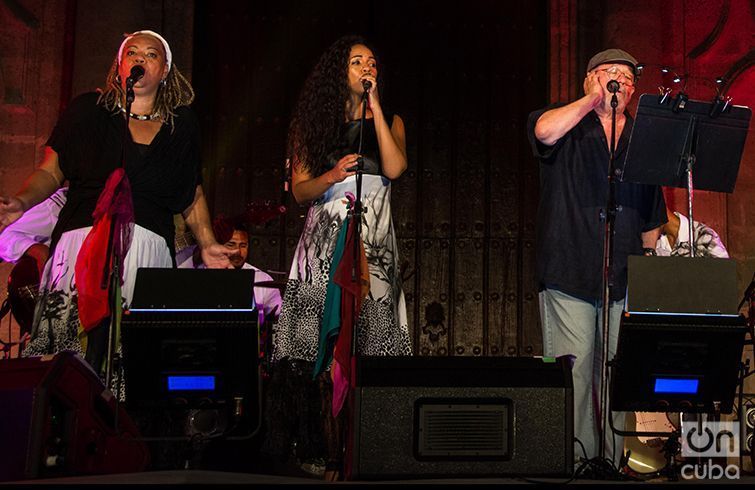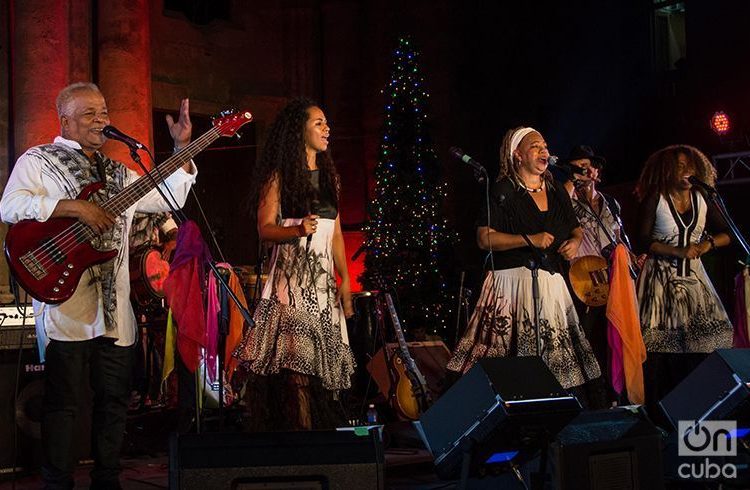Nineteen days after Fidel Castro’s death there still existed, throughout the country, a kind of unofficial curfew. Shows, concerts and cultural events of a certain magnitude were reprogrammed or their profile considerably reduced. But on December 14, 2016, after all the ropes were tightened, a concert would take place in Havana’s Cathedral Square. A beautiful concert for the 40 years of Síntesis, one of the most emblematic Cuban bands of all times, together with their guests.
Three years later, that concert, released as the DVD Síntesis 4 decades (Unicornio, 2019), directed by Joseph Ros, is evocative ―especially music wise, according to the director― of a show that was lucky to have the performances of Silvio Rodríguez, Amaury Pérez, Ernán López-Nussa, Niurka González and José María Vitier, among others.
It is precisely the release of the band’s new production and its nomination to the Cubadisco Awards which motivated this dialogue with Carlos Alfonso and Ele Valdés, founders of Síntesis. A pretext, as if it one was necessary, to also speak of 40 years of music.
How did the idea come up of celebrating this anniversary with a concert in Cathedral Square?
Ele Valdés (EV): Síntesis started there on December 14, 1976, I think it was to celebrate the day of culture workers, and we had always yearned to celebrate each anniversary there, but for one or another reason they gave us other places like the Karl Marx, because our concerts also included dances.
Carlos [Alfonso] contacted Eusebio [Leal] through common friends so they would give us the space; they even spoke with the Cardinal, because the Square belongs to the church, and they agreed, because Eusebio knows about Síntesis’ trajectory.

How difficult was it to bring together in that concert so many artists of that caliber, who always have commitments?
EV: It wasn’t difficult, first because it was December, and almost all of us Cuban artists spend December with the family, in the country, rarely outside; and the other thing is that they are really friends. Carlos called them and they all said “count me in,” starting with Silvio, who is always the busiest.
Carlos Alfonso (CA): We are also joined by a whole work career and friendship with that group of artists.
What has been the most difficult for Síntesis in these 40 years?
CA: For me it has been overcoming misunderstandings, which have been many, because first we started doing rock and roll, and it was not well looked upon….
We had to assume a line of work with difficulties; not only here, but also in Mexico, where we were announced as part of the New Song Movement so as not to announce ourselves as a rock group, because theatres didn’t put on rock, it was almost always in open-air spaces…. Then we chose an even worse path, that of Afro-Cuban music, that no matter how much the institutions and the State have done to give a push to everything that’s folklore, there are always people who look at it as obscurantism, witchcraft. Now less, but Eme [Alfonso] tells me things about school, how they told her that she sang for the devil, things like that, and then we went along carrying those two burdens: rock and roll and Afro-Cuban music. Quintín Pino Machado was the most supportive of this group, he gave us the instruments and told us: “we want them to do their job.”
EV: He said: I would like my son to listen to rock, to listen to Síntesis, and not only to the American and English groups.

And that’s how you took off….
CA: Síntesis was formed with a number of people who were hooked on music, it was practically an alienation because we spent the entire day rehearsing and creating. We had several composers: Amaury Pérez, José María Vitier, Mike Porcel, and me, so when we needed a text it would appear, we would exchange. Síntesis had one of the best vocal groups, it had the voices of Tema IV, it had good instrumentalists and good composers, I don’t think we could take off badly.
The first thing that happened with Síntesis was that each person lost their identity, José María Vitier was the keyboardist, Mike Porcel was a composer…and that didn’t last long, because those people, with their strength, were not going to be able to stand it that long, and so they started leaving the band. I think the first one was Amaury, then José María, but he left some compositions that are so beautiful, so well done, it’s an incredible thing for the time.
EV: Another of our difficulties has been the international management of our career. The group emerged in the 1980s, it was the most popular stage, and we did not have good international management. I think that when we released Ancestors we could have taken advantage of that moment, even though we had very good luck, because the work imposed itself, and the impresarios who came mostly from Europe were interested and that is how we participated in the best jazz festivals in the world.
CA: And we went by chance, because someone called us, someone contacted us.
EV: In 1990 we went to London, for a Week of Cuban Culture; we were Síntesis, Los Muñequitos de Matanzas, (Manuel) Mendive and the Septeto Igancio Piñeiro. How did we go? The person organizing that event, Lucy Durán, went to Varadero, and on the bus she took, the driver was hearing the Ancestros cassette, and she said “who are the ones who sing?” “Ah, it’s Síntesis, they belong to Cubartistas,” and she said: “I want that group,” that’s how we went to London. They have been strokes of luck.
Why then cling to that kind of music?
EV: Carlos has his point of view, but I’m going to speak from the outside, because you know that composers have their world.
After we did this symphonic rock work in Spanish, we had the first international experience in 1979, forming part of the Days of Cuban Culture in the socialist countries, and we realized that the repertoire that we had was not what attracted attention, what most attracted were things that had Cuban elements, our folklore.
From that experience, and the proposal of Marta Valdés who asked Carlos why we didn’t do with Síntesis the work we used to do with Tema IV, which was to rescue popular themes, Ancestors emerged, in 1987, and starting then it is the other aspect of the band, and for the composers it meant doing something new but based on something very ours, which were the African roots.

CA: As a child, a young person, I had a tremendous rebelliousness inside me, and to whatever I was told “no” was what I was going to do, I was going to go against all rigid thinking, because that is my spirit. I studied to be an electrician, it was what I studied, and my friends appeared with a record of The Beatles and The Beach Boys and that was what I heard, you had to put the record inside another album cover, and that creates a sense of rebellion. Then that fusion of two things that were little supported, because of that irreverent spirit, in addition to what Ele said, that worked better…, but when one starts in music one doesn’t think about what will work anymore.
EV: In addition, we had already done Variaciones de un zapateo cubano in 1979 and that was one of the things that was most liked, because of that thing with the roots; We already had a background with Tema IV with which we had worked the popular songs, the cries, and we had that inside us. And we were very curious about the Afro-Cuban aspect, because at that time we also participated in a documentary called Trinidad, by Héctor Veitía and that was the first time we participated as a group in a religious festival. I did know about that because of my family, but we felt part of something that we didn’t even know had lyrics, and we ended up dancing and with goosebumps, because even if you don’t know anything, it is catchy and people who have faith radiate an energy in all the participants.
CA: At that time, we did several interviews and I remember that I said I was as happy with that music as with Beethoven’s music, for me they were two points of tremendous artistic sensitivity, and with the passage of time we have discovered that practically all the music has come out of there. Even the rarest and most contemporary music. I think so, that everything is there.
How many members of the band practice the Yoruba religion?
CA: None.
EV: My family on my mother’s side was religious and I participated as a child in some things: “bring the girl so she can ring the bell to Oshun,” that kind of neighborhood things, but my dad was an atheist.
That kind of thing makes you very curious because as it is a religion based on nature, it has more points of contact with what’s real. We all started studying, with the help of Natalia Bolívar, for example, looking in bookstores, and we are scholars on the subject, in addition to the fact that in Havana the singing is different from Matanzas and Santiago, because it’s an oral tradition….
Then the creative process of the band begins with research.
EV: Absolutely.
And currently only Carlos composes?
EV: There are other composers. María del Carmen Ávila is our singer now, very young, she is 27 years old, she comes from the National Choir, but we have taken her to the workshop of the National Folklore Group, so that she learns the songs, everything; Dennis Peralta started studying the batá, they have to know well what they are going to devote themselves to.
CA: I have tried to instill in the people who are devoted to this that they go to the root, you have to enter the root which is where you really learn.
How do you achieve that vitality on stage, with everything so careful, from the costumes, the production, the image in general, after 40 years?
CA: That’s Ele.
EV: No, you say that, and I have continued taking care of that, but we were lucky that in the beginning we counted on the advice of actor José Antonio Rodríguez, of Carlos Ruiz de la Tejera, and people who had to do with production, and we came from the ENA [National Art School], where you are integrally formed, because although you study music you relate to people from the plastic arts, from dramatic arts.
When Síntesis emerged we had that in mind, and José Antonio taught us: if there is only one, you can’t talk to the other, the minimum production rules; unfortunately, there is no subject that teaches musicians their attitude on stage, all that falls on us, and we have taken great care of that and the people who become part of the group start their formation in that discipline and that requirement.
Right now all our members are very young, and they like what they do, after investigating the why of this song and polyrhythm, and that it’s contagious because that’s the principle of this music: you participate, even if you don’t know what you are going to say. That spirit has not been lost when performing a song, that reciprocity, that contagion, it’s implicit in the music.

CA: I always tell the musicians of Síntesis: don’t believe we are doing a favor to Afro-Cuban music, Afro-Cuban music sounds on its own, and it’s a participation music, if you are in an Afro-Cuban ceremony with music I’m sure you’ll get infected. If you are going to give a concert, with elements of Afro-Cuban music and you don’t achieve participation, it’s because the work is not well done, not only in terms of the music, it can be the staging, lack of vigor, singing in a monotonous way…. To this we must extract what it is, participatory music and under that rule we have achieved things.
Your children X and Eme enter the band at different times. I wonder how that process happened, and if at some point (a rehearsal, a concert), they are just professional musicians performing, or they are still family.
CA: No, not at all, this is the whip. (They laugh)
EV: Neither on our side or theirs.
CA: We’ve been very lucky, really. I really like how things come naturally to me, to not force anything, and our children entered when they had to enter. I remember that the first time X worked with us was because Lucía Huergo got sick and we said “play,” and he said “but I don’t know the repertoire,” and I said “I don’t know, just play,” because if he was formed here, from hearing the rehearsals so many times, he was going to have something
The first time we called Eme she was 12 years old, and she said: “What do I do?” “Sing.” And then we had the granddaughter, who knew everything too.
EV: As they have left they have entered. They have been taking off, but when we have needed their collaboration there they are. X has made the videos for Síntesis, and he’s worked as a musician for 17 or 18 years, and we can also count on Eme.
CA: I sometimes say, is it because one is old? But no, because the two call us to do things in their concerts, or on the discs, then it’s not a generation problem, and one stops here and says, should it be? Or not? But yes, girl, music is one.
Do you feel there’s a generational problem in the how Cuban music is made and consumed today?
EV: Partly yes, I believe so, because that about “what the young people like,” what is the music that young people like? I have a granddaughter who will turn 20 now, her discography includes what I heard as a child, and there is Adele, who is from now, and hey Van Van, for example…. But the way it is being projected here, with that label “for young people,” that the media and some programs have created…. The young people of today are in “let’s make a song a hit,” not in making music, not generalizing.
CA: The generational problems are very strong, because even when one of us, the Cuban composers, write a text, they think “what will Silvio say about this text” or “what will Amaury say” or “what will Pablo Milanés say,” we are always like “will we be approved?” “will we pass the school?” And that has been lacking, a bit of having continued insisting; I deeply love everything they did, and it should be useful for something, for the kids to notice it a little….
Something you particularly like? Do you think there is a genre at the forefront?
EV: Jazz, especially jazz, is very well represented.
CA: There’s Cimafunk, who has done a still incipient work, who has started from another cell. It seems to me that, if he endures the unexpected fame, tomorrow he could be….










